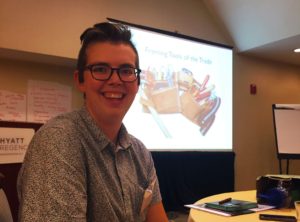Young conference attendees hope to build more inclusive communities
WASHINGTON, D.C. — Asked to create a mental image of the people most likely to participate in a national rural conference, few would imagine Kendall Bilbrey. And, actually, that’s the point.
Bilbrey is originally from southwest Virginia, but now calls Whitesburg, Kentucky home, and serves as the coordinator of the Stay Together Appalachian Youth (STAY) Project. The organization hopes to create an environment in which young people are empowered to stay in or near their hometowns, and seeks to amplify the voices of those who currently feel marginalized.
“Growing up in Appalachia, there are people constantly putting ideas on you about what you are — for instance, that everyone living in this rural region is poor,” Bilbrey told me at the 2015 National Rural Assembly earlier this month.
“So, this organization came together to fight those narratives. We want everyone to know that we are Appalachia. We are young people. We have a voice, and we want to tell our stories. And, yes, there is some negativity when we tell those stories, but there’s a lot of positive too.”

Similar sentiments echoed around the conference room as young rural leaders throughout the nation discussed their towns and passions at the assembly’s kickoff event. But even in this group where Caucasians are a noticeable minority, Bilbrey stands out.
While the STAY Project is focused on all young people in Central Appalachia, it has specific interest in creating safe, rural spaces for those who are gay or transgendered. The focus is of personal interest to Bilbrey, who hopes small changes, like requesting use of gender-neutral pronouns at the assembly, will ensure comfort for all participants.
“We are particularly interested in lifting up and amplifying voices that are not often heard as part of rural discussions — young people of color, LGBT and transgender people and those with who are low-income,” said Bilbrey.
To that end, the youth-led STAY Project goes directly to its base and asks what is needed in order for more young people to remain in rural communities. The organization connects young people with resources and skills so that their vision can become a reality.
Long-term goals are similar to those held by leaders in Iowa’s small towns. They want the area to be economically and environmentally sustainable — a place where young people can build and actively participate in diverse, inclusive and healthy communities. When a multitude of voices are brought together, they say, the community is better, stronger and more resilient.
“It is extremely important for young people to have their own space, because so often in social justice work and non-profits, people talk about creating safe spaces, but, sometimes even within those established safe spaces, it isn’t always safe,” Bilbrey said.
“This is especially true for trans or queer people or young people of color. Even within established safe spaces they may feel uncomfortable, like they can really discuss this or that. … Sometimes this is because they are unwilling to out themselves, especially if they are a part of a group where no one looks or is like them. For those who have worked their entire lives to become the person they are now, it can be scary to just offer up your story.”
And of all the states represented at the Rural Assembly, the irony of someone from Kentucky — a state currently making waves in Iowa caucus circles and known nationally for a county clerk’s refusal to issue marriage licenses — taking a stand for gay and transgendered rights in rural America isn’t lost on Bilbrey.
“Like most places, we’ve seen a shift among young people to be more queer-friendly, but, also like other places, there are still some who just automatically oppose it,” Bilbrey said. “I think a lot of it is connected to religious belief, but it isn’t only about that.”
And while Bilbrey may be one of the most outspoken conference participants when it comes to making rural places more welcoming and inclusive, there are other young leaders in attendance working toward the same goal.
“Throughout our lives, people have told us to leave,” Bilbrey said. “They’ve said that if you stay around your hometown, you aren’t successful. But that’s what we want to be able to do. It’s time to take that stigma away.”
This column by Lynda Waddington originally published in The Gazette on September 20, 2015. Photo credit: Lynda Waddington
